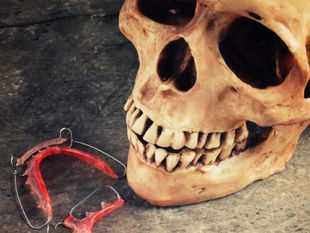
A CHILD'S DENTAL HEALTH BEGINS AT BIRTH
Aug 6, 2022
3 min read
13
38
0
A child's dental health begins long before the first appearance of teeth. Starting in the womb, your baby is beginning to form its jaw and oral cavity. This formation continues after birth and is critical to both, your child's airway and dental health.

While there is the rare exception of a natal tooth, most babies are born without teeth. Most of the time a child will get their first teeth between the age of 6-8 months. The erupting of primary teeth will continue into their early teen years for most children.
Teething is the process and pain that babies feel when their teeth are erupting. The level of distress is dependent on your baby. Your baby may be fussier than usual, may have increased drooling, and may want to chew or bite on objects more than usual.
Teething is the process and pain that babies feel when their teeth are erupting. The level of distress is dependent on your baby. Your baby may be fussier than usual, may have increased drooling, and may want to chew or bite on objects more than usual.
WHY ARE BABY TEETH IMPORTANT TO LONG-TERM DENTAL HEALTH?
When your baby goes from gummy grins to toothy smiles, they’ve reached a significant milestone. Those newly erupting baby teeth serve an essential role in the development of your baby’s teeth and mouth.
The first, or primary teeth, that your child develops are critical to their long-term health. As they come in, they aid in a variety of functions:
They give your child the ability to chew and eat. Chewing not only helps them process food, but it also helps to strengthen and develop their jaw.
They work, along with the tongue, in an effort to allow your child to learn to speak.
They were placeholders for the permanent teeth that are to come and aid in the development of your child's oral and facial development.
While they aren't permanent teeth, it is important to teach your child how to care for their teeth. Brushing twice a day and flossing is important as it will help to prevent cavities. Cavities, even in "baby teeth" can cause tooth decay, dental infections, and even root canals, if left untreated. This can also cause long-term issues as they move into adulthood.
Tooth decay is one of the most common chronic childhood diseases. By age 2, 10% of all children have had a cavity. That increases to 28% by age 3 and 50% by age 5! If untreated, tooth decay can progress quickly causing teeth to break down.
Good oral health is one of the key ingredients necessary for creating a strong and healthy healthspan for your child.
WHEN SHOULD YOUR CHILD SEE THE DENTIST?
The American Academy of Pediatrics, the American Academy of Pediatric Dentists, and the American Dental Association all recommend that your child visit the dentist for the first time by the age of 1.
Dental visits are important for promoting good oral health. These visits can also identify potential problems, such as airway issues or an underdeveloped jaw, and treat these problems earlier --- ensuring better health for your child.
FIND A PEDIATRIC AIRWAY-CENTRIC DENTIST
If you are in the US or Canada you can use the Dentist Locator tool from Airway Health Solutions to locate an airway dentist in your area.
SPOTLIGHT BOOK RESOURCE FOR PARENTS
So, you want to know what it will take to ensure your child will grow up to become a healthy and happy young adult in today’s world? Dr. Susan Maples, a dentist and passionate pediatric health educator, finally cracks the code on the most critical contemporary elements, and she passionately delivers the recipe:
Happy Healthy Child Ingredients:
1 Brave Parent
1 Growing Child
Gobs of Evidence-Based Science
36 Years of experience as a health professional and child advocate
Generous heaps of humor, transparency, and tenderness
A dash of willingness to grow in your own health and happiness
Instructions:
1. Read the book Brave Parent: Raising Healthy, Happy Kids Against All Odds in Today's World, build a plan, and brave it out!
2. Share the book, spread the word, and join the Brave Parent tribe
3. Help cultivate a local community of Brave Parents to encircle your child
Yield: One healthy, happy child at a time.
Becoming a Brave Parent will change the course of your child’s life….and yours! By making the bold decisions you know are best, you’ll help inspire a new generation filled with longevity, optimal health, and happiness— beginning in your own home.








